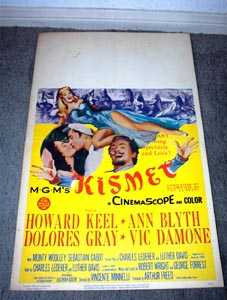
KISMET
US, 1955, 113 minutes, Colour.
Howard Keel, Ann Blyth, Dolores Gray, Vic Damone, Monty Wooley, Sebastian Cabot, Jack Elam.
Directed by Vincente Minnelli.
There have been many film versions of Kismet, based on a play by Edward Knoblock, being filmed in 1920, 1930 and then in the classic 1944 version with Ronald Colman as the poet and Marlene Dietrich. The film was directed by William Dieterle.
The play was soon adapted for Broadway with a libretto by Charles Lederer and the music of Borodin. Lyrics were composed to Borodin’s melodies, many of them still well known, especially ‘Stranger in Paradise’ and ‘Baubles, Bangles and Beads’. Other songs include ‘This is My Beloved’, ‘Night of My Nights’.
Vincente Minnelli had directed a number of musicals for MGM including Meet Me in St Louis, The Pirate, An American in Paris, The Bandwagon. He was soon to win an Oscar for Gigi. He brings his eye for opulent musicals to the screen as well as his talent for staging music and dancing.
This was one of the last of the musicals from MGM, they had run their course by the mid-50s after a very successful decade.
Howard Keel had made his mark in these musicals including Annie Get Your Gun, Showboat, Lovely to Look At and Kiss Me Kate. Ann Blyth had appeared with him in Rose Marie and had also appeared in The Student Prince and The Great Caruso. Dolores Gray enjoys herself as the suggestive Lalume. Vic Damone is the young Khalif. A group of character actors who normally appear as villains or in westerns were in support including Jack Elam, Ted du Corsia. Comedian Monty Woolley also appears.
The film is a story of the Arabian Nights, like a song from Scheherezade. Howard Keel is a poet who wants the best for his daughter, finds some gold, is arrested because of suspicions about the gold. However, there are various other strands in the Arabian Nights storytelling about Khalifs, glamorous women, beggars and thieves.
1. How real was this film? Was it merely meant to be fantasy? how did it determine our response? Why do we respond so differently to fantasy?
2. How conventional a musical was this film? What conventions of song and dance did it use? Well?
3. The music came from the classical work of Borodin. Were the tunes and the lyrics a pleasant adaptation of a classic?
4. The hero was a con man. How attractive was he? Did he harm anyone? Did he do good? Cheer people up? How impressive was his ability to talk and to make poems? The coincidences of his magic? How near was he to believing his own magical powers? Was he a greedy man? How well did he love his daughter?
5. How attractive was the fairy-tale romance of the prince and the poor girl? Were the prince and the poet's daughter merely conventional hero and heroine? Or were they something more? Why? How did their songs enhance their characters?
6. How did the irony of Lalume and her working with the poet counterbalance the romance and fantasy? Was this a healthy and humorous irony?
7. How satirical was the section on the Wazir? How much satire on people who are greedy for power? People who are credulous when seeking power? Believing in magic or its equivalent?
8. A slightly serious tone came at the end as regards death and banishment. Were any serious moral questions raised? Or were they touched upon? How satisfactorily?
9. Why was this film enjoyable? Are musical fantasies always enjoyable?